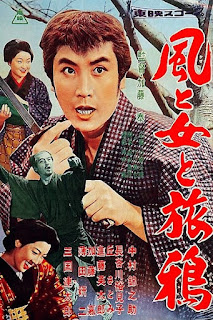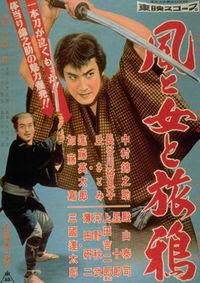Wind, Woman and Road

Director: Tai
Kato
Year: 1956
Rating: 7.0
Aka - Kaze to onna to Tabigarasu
This is an early film in the career of Japanese
director Tai Kato before he began his Yakuza and Samurai trademark films
in the 1960s. Previously, Kato was directing some of what are termed Jidaigeki
films, ie period dramas. This one includes some sword fights among the drama.
But it also edges into what was coming; the Japanese New Wave movement of
youthful rebellion and disaffection. It makes for a thoughtful if slow moving
film.
Two wanderers, one an older man with a disreputable
past and a younger man with a hatred for all around him bump into each other
and strike up an odd friendship. Sentaro (Rentaro Mikuni) is reminded of
his dead son by the freewheeling manner of Ginj (Kinnosuke Nakamura) and
to some degree Ginji sees Sentaro as a father figure. His father had slaughtered
a family years ago and deserted him and his now dead mother. Through comedic
circumstances they end up with a chest of gold. Ginji is inclined to take
it but Sentaro persuades him to return it to a nearby village.
The village though is Ginji's old home where
his father killed a family and where they harrassed his mother to her death.
The village wants nothing to do with Ginji and he hates them but Sentaro
wants to settle down, reorient his life and he wants Ginji to do the same.
The interactions between the two of them, the towns folk and the girl Yuki
(Satomi Oka) that Ginji falls for leads to an unexpected ending when Hanzo
the Shark and his gang come for the gold.


